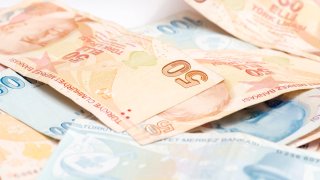
- The lira's spiral has been staggering — it plummeted from roughly 8.5 to the dollar in late August to more than 13 to the dollar within a mere three months.
- "I have never advocated and won't be advocating for interest rate increases," Turkish President Recep Tayyip Erdogan said over the weekend.
The Turkish lira slid to a new record low on Tuesday after fresh statements from Turkish President Recep Tayyip Erdogan opposing any interest rate increases.
The currency hit a low of 13.47 to the dollar in late afternoon trading, surpassing its previous record low last week of roughly 13.45 to the greenback, following renewed worries over the country's monetary policy and concerns over the Covid-19 omicron variant.
Get DFW local news, weather forecasts and entertainment stories to your inbox. Sign up for NBC DFW newsletters.
The lira's spiral has been staggering — it plummeted from roughly 8.5 to the dollar in late August to more than 13 to the dollar within a mere three months.
Erdogan has consistently refused to raise interest rates to reign in rising double-digit inflation, and the lira has plummeted in value in recent years largely as a result of that. Inflation in Turkey is now near 20%. Erdogan has fired three central bank chiefs for not aligning with his belief that rates should not be raised.
"I have always been arguing for lower interest rates and repeating that the rates should be lower. I have never advocated and won't be advocating for interest rate increases," Erdogan was reported by Turkish press as saying on Sunday.
Money Report
Economic experts and former officials in the country have openly pleaded for the president to change course, as it's commonly accepted that he in fact has power over the central bank's monetary policy decisions rather than the bank being independent. But Erdogan has long held the unusual belief that higher interest rates cause inflation, rather than bring it down.
"Interest rates are the reason, inflation is the result. My argument hasn't changed, I still defend it, believe in it," the president said.
Investors seem to hold a very different view, if the dramatic sell-off last week that brought the lira to its latest record low is anything to go by. The lira "is now firmly in crisis territory," analysts at London-based Capital Economics wrote at the time, adding that "higher inflation and tighter domestic financial conditions are likely to sap Turkey's recovery."
Lira crisis casts shadow over positive GDP growth
Turkey reported positive GDP growth figures this week, but the pain of a weakened currency outweighs that positive news, said Tim Ash, senior emerging markets strategist at BlueBay Asset Management.
"Lower rates might deliver high real GDP growth but at the price of a weaker currency, higher inflation and longer term concerns about macro financial stability," Ash wrote in a note Tuesday.
Turkey's GDP growth was an impressive expansion of 7.4% in the third quarter year-on-year, and 2.7% expansion from the previous quarter, driven by household and government consumption and exports. But the currency crisis and soaring inflation mean that those figures are far from the full picture.
"We think that the GDP figures released today tell us little about the pace of economic activity going forward as the recent sell-off in the Lira is likely to impact economic activity significantly," analysts at Goldman Sachs wrote.
Nevertheless, the bank is revising its 2021 growth forecast upward by 1 percentage point to 10.5%. At the same time, Goldman is revising down its 2022 growth forecast by half a percentage point to 3.5% year-on-year.
There were also unconfirmed reports Tuesday from local media that the Turkish central bank's head of markets Doruk Kucuksarac had resigned, someone Ash described as a "credible" figure. The resignation has not been officially announced.






